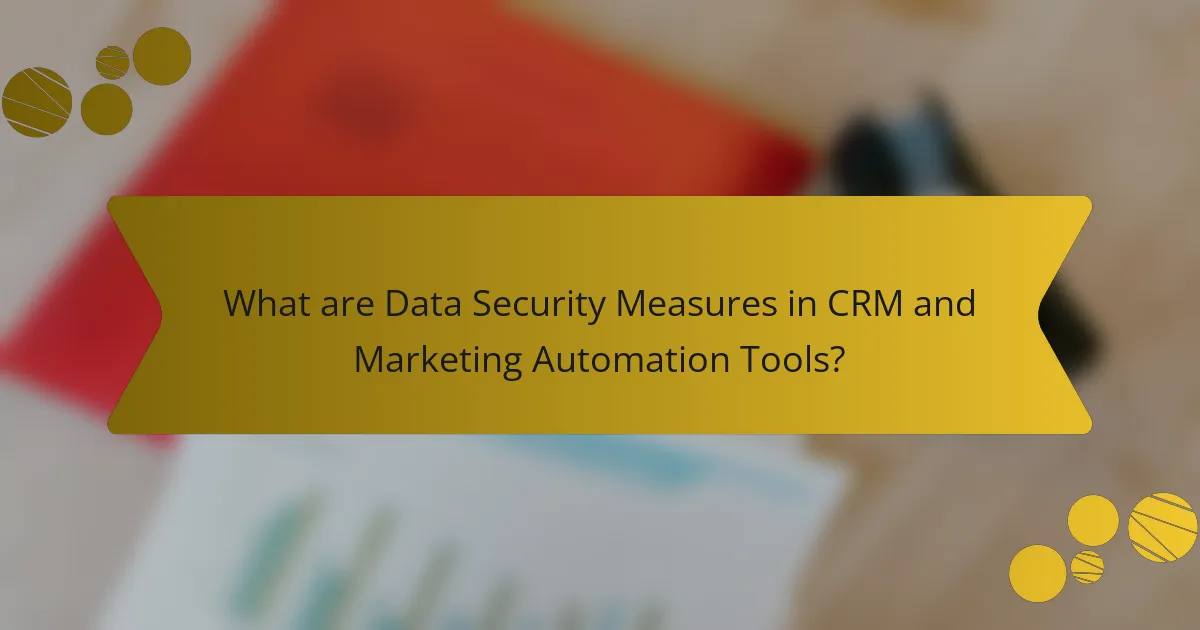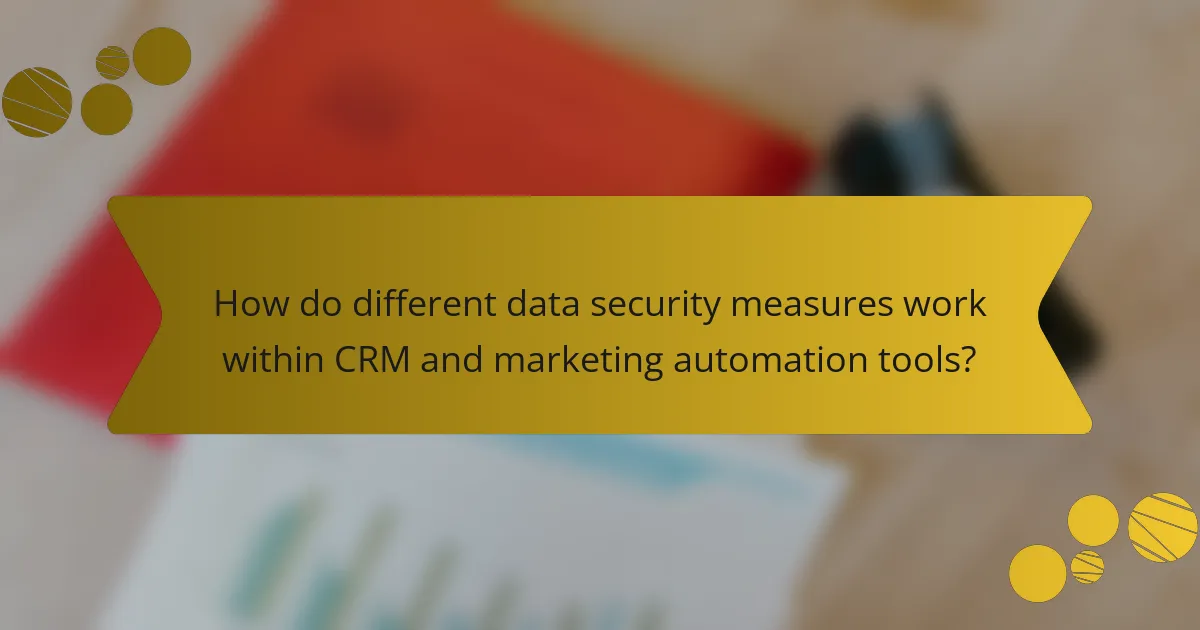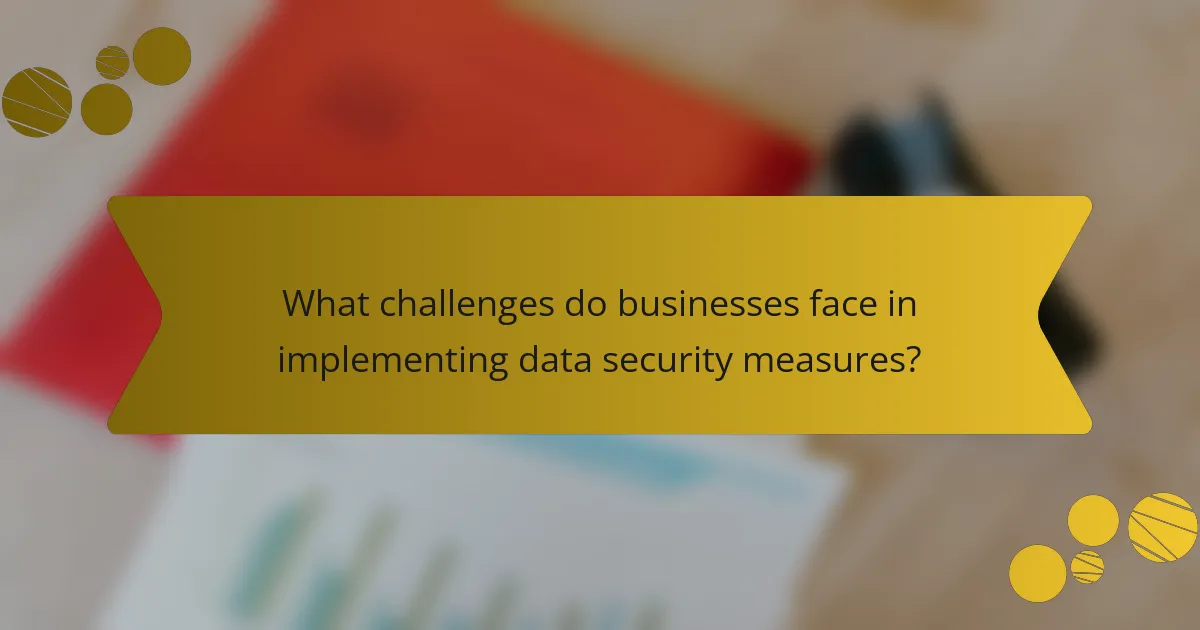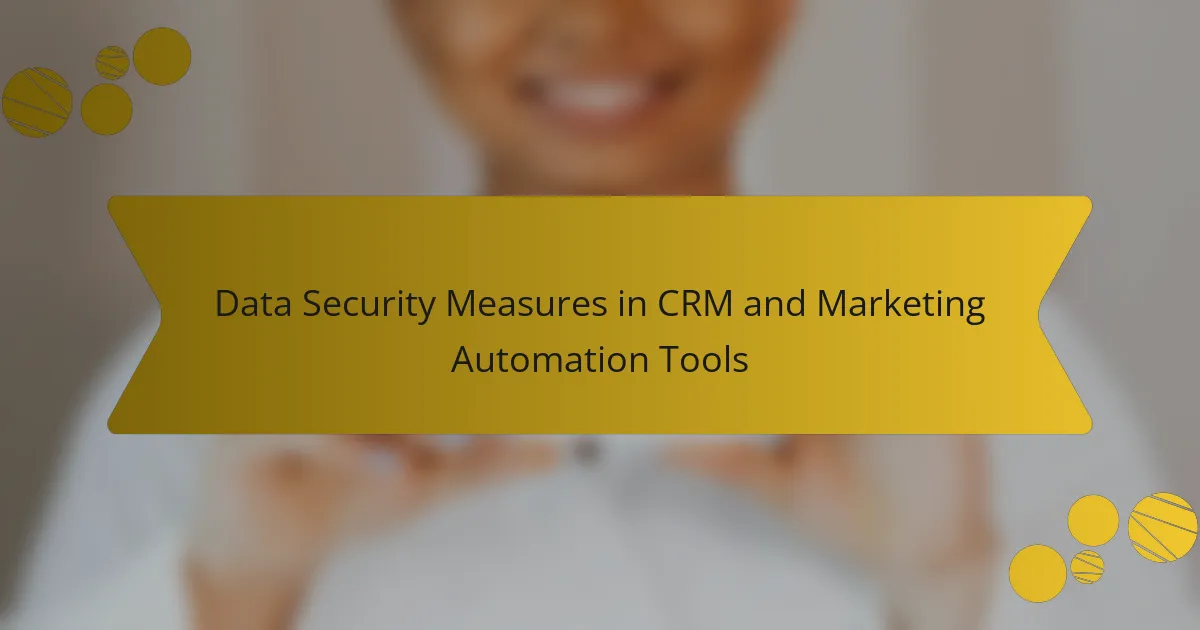Data security measures in Customer Relationship Management (CRM) and marketing automation tools are essential for protecting sensitive information. Key measures include encryption, which secures data by converting it into a coded format; access controls that restrict data visibility and modification based on user roles; and regular audits that help identify vulnerabilities and ensure compliance with regulations like GDPR and CCPA. Additional security features, such as multi-factor authentication and data backup solutions, further enhance protection against data breaches. However, businesses face challenges in implementing these measures, including compliance complexity, integration issues, high costs, and the need for ongoing employee training.

What are Data Security Measures in CRM and Marketing Automation Tools?
Data security measures in CRM and marketing automation tools include encryption, access controls, and regular audits. Encryption protects sensitive data by converting it into a secure format. Access controls limit who can view or edit data based on user roles. Regular audits help identify vulnerabilities and ensure compliance with data protection regulations. Multi-factor authentication adds an extra layer of security by requiring additional verification for user access. Data backup solutions safeguard against data loss. Compliance with standards like GDPR and CCPA ensures that organizations handle personal data responsibly. These measures collectively enhance data security and maintain customer trust.
Why is data security crucial for CRM and marketing automation tools?
Data security is crucial for CRM and marketing automation tools because these systems handle sensitive customer information. Protecting this data prevents unauthorized access and potential breaches. A breach can lead to significant financial losses and damage to brand reputation. According to a 2021 report by IBM, the average cost of a data breach is $4.24 million. Additionally, compliance with regulations like GDPR and CCPA is mandatory for businesses. Non-compliance can result in hefty fines and legal consequences. Ensuring data security builds customer trust and enhances brand loyalty. Therefore, robust security measures are essential for the integrity and success of CRM and marketing automation tools.
What types of sensitive data are typically managed within these tools?
CRM and marketing automation tools typically manage various types of sensitive data. This includes personal identifiable information (PII) such as names, addresses, and phone numbers. Financial data, including credit card information and billing details, is also commonly stored. Additionally, these tools handle behavioral data, which tracks user interactions and preferences. Health-related data may be included in specific industries, such as healthcare. Furthermore, login credentials and passwords are often managed within these systems. According to a report by the Ponemon Institute, 63% of organizations have experienced a data breach involving sensitive data. This highlights the importance of securing such information within these tools.
How do data breaches impact businesses using CRM and marketing automation?
Data breaches severely impact businesses using CRM and marketing automation. They can lead to loss of customer trust and reputational damage. According to a study by IBM, the average cost of a data breach in 2021 was $4.24 million. This financial burden includes legal fees, regulatory fines, and remediation costs. Additionally, businesses may face operational disruptions as they address security vulnerabilities. Data breaches can also result in the loss of sensitive customer data, affecting marketing strategies and customer relationships. Furthermore, regulatory compliance issues may arise, leading to further financial penalties. Overall, the implications of data breaches are profound and multifaceted for businesses relying on CRM and marketing automation.
What are the key components of data security measures in these tools?
The key components of data security measures in CRM and marketing automation tools include encryption, access controls, data masking, and regular security audits. Encryption protects sensitive data during transmission and storage. Access controls ensure that only authorized personnel can access specific data. Data masking conceals sensitive information in non-production environments, reducing exposure risk. Regular security audits identify vulnerabilities and ensure compliance with security standards. These components collectively enhance the overall security framework of CRM and marketing automation tools.
What role does encryption play in securing data?
Encryption plays a critical role in securing data by converting it into a coded format. This process ensures that only authorized users can access the original information. When data is encrypted, it becomes unreadable to unauthorized parties. For instance, AES (Advanced Encryption Standard) is widely used to protect sensitive data. According to the National Institute of Standards and Technology (NIST), encryption can significantly reduce the risk of data breaches. In 2020, over 90% of organizations reported using encryption as a key security measure. This illustrates its effectiveness in safeguarding data integrity and confidentiality.
How do access controls enhance data security?
Access controls enhance data security by limiting who can view or manipulate sensitive information. They ensure that only authorized users have access to specific data and systems. This restriction reduces the risk of data breaches and unauthorized access. Access controls can be implemented through user authentication methods, such as passwords and biometrics. They also involve role-based access, granting permissions based on user roles. According to a study by the Ponemon Institute, companies with strong access controls experience 50% fewer data breaches. This demonstrates the effectiveness of access controls in protecting data integrity and confidentiality.
What best practices should businesses follow for data security in CRM and marketing automation?
Businesses should implement strong password policies for data security in CRM and marketing automation. This includes requiring complex passwords and regular updates. Access controls should be enforced to limit data access to authorized personnel only. Regular software updates and patches are essential to protect against vulnerabilities. Data encryption should be utilized for sensitive information both at rest and in transit. Regular security audits can help identify weaknesses in the system. Employee training on data security best practices is crucial for maintaining awareness. Compliance with relevant data protection regulations, such as GDPR, is necessary to ensure legal adherence. These practices collectively enhance the security of CRM and marketing automation systems.
How often should data security audits be conducted?
Data security audits should be conducted at least annually. This frequency helps organizations identify vulnerabilities and ensure compliance with regulations. Some industries may require more frequent audits, such as quarterly or biannually. Regular audits help maintain data integrity and protect against breaches. The National Institute of Standards and Technology (NIST) recommends regular assessments to adapt to evolving threats. Conducting audits regularly can significantly reduce the risk of data breaches and enhance overall security posture.
What training should employees receive regarding data security?
Employees should receive training on data security best practices. This includes understanding data classification and handling sensitive information properly. Training should cover password management techniques, including the use of strong passwords and two-factor authentication. Employees must learn to recognize phishing attempts and social engineering tactics. Regular updates on compliance regulations such as GDPR and CCPA are essential. Additionally, training should include incident response protocols in case of a data breach. Practical exercises on secure data sharing and storage methods are beneficial. Continuous education on emerging threats and security technologies is also important.

How do different data security measures work within CRM and marketing automation tools?
Data security measures in CRM and marketing automation tools protect sensitive information. These measures include encryption, access controls, and regular audits. Encryption secures data by converting it into a coded format. This ensures that only authorized users can access the original information. Access controls limit who can view or modify data. They are established through user roles and permissions. Regular audits help identify vulnerabilities and ensure compliance with regulations. Tools often implement two-factor authentication for added security. This requires a second form of verification beyond just a password. By employing these measures, organizations can safeguard customer data and maintain trust.
What are the most common security protocols used?
The most common security protocols used include SSL/TLS, HTTPS, and SFTP. SSL (Secure Sockets Layer) and TLS (Transport Layer Security) encrypt data during transmission. This prevents unauthorized access and ensures data integrity. HTTPS (Hypertext Transfer Protocol Secure) is an extension of HTTP that uses SSL/TLS for secure communication over a computer network. SFTP (Secure File Transfer Protocol) provides secure file transfer capabilities by encrypting both commands and data. These protocols are widely adopted in various applications, including CRM and marketing automation tools, to protect sensitive information.
How does multi-factor authentication enhance security?
Multi-factor authentication enhances security by requiring multiple verification methods for access. This process adds an extra layer beyond just a password. Users must provide something they know, like a password, and something they have, such as a mobile device. This makes unauthorized access significantly more difficult. According to a 2020 report by Microsoft, multi-factor authentication can block 99.9% of account compromise attacks. By implementing this method, organizations protect sensitive data in CRM and marketing automation tools. It mitigates risks associated with stolen passwords and phishing attacks.
What is the importance of regular software updates for security?
Regular software updates are crucial for maintaining security. They patch vulnerabilities that attackers can exploit. For instance, in 2020, 80% of breaches involved unpatched software. Updates also enhance features and improve overall system performance. By regularly updating software, organizations reduce the risk of data breaches. This proactive measure is essential in protecting sensitive customer information. Cybersecurity experts emphasize that timely updates are a foundational aspect of a robust security strategy.
How can businesses ensure compliance with data protection regulations?
Businesses can ensure compliance with data protection regulations by implementing robust data governance frameworks. These frameworks should include regular audits of data handling practices. Training employees on data protection policies is essential. Businesses must also establish clear data processing agreements with third-party vendors. Utilizing encryption for sensitive data is a critical security measure. Regularly updating privacy policies to reflect current regulations is necessary. Monitoring compliance through ongoing assessments helps identify potential risks. According to the General Data Protection Regulation (GDPR), organizations can face fines up to 4% of annual global turnover for non-compliance, emphasizing the importance of adherence.
What are the key regulations affecting data security in CRM and marketing automation?
Key regulations affecting data security in CRM and marketing automation include GDPR, CCPA, and HIPAA. The General Data Protection Regulation (GDPR) mandates strict data protection and privacy for individuals in the European Union. It requires businesses to obtain explicit consent for data collection and processing. The California Consumer Privacy Act (CCPA) enhances privacy rights for residents of California. It allows consumers to know what personal data is collected and to request its deletion. The Health Insurance Portability and Accountability Act (HIPAA) governs the protection of health information in the U.S. It requires healthcare organizations to implement safeguards for sensitive patient data. Compliance with these regulations is crucial for companies using CRM and marketing automation tools to avoid legal penalties and protect consumer trust.
How can organizations prepare for compliance audits?
Organizations can prepare for compliance audits by conducting thorough internal assessments. They should review relevant regulations and standards applicable to their industry. This includes understanding data protection laws such as GDPR or HIPAA. Organizations must ensure all documentation is up-to-date and accessible. They should implement regular training for employees on compliance requirements. Conducting mock audits can help identify gaps in compliance. Engaging with external auditors can provide an objective perspective. Maintaining clear records of data handling and security measures is essential for transparency. These steps collectively enhance readiness for compliance audits.

What challenges do businesses face in implementing data security measures?
Businesses face several challenges in implementing data security measures. One major challenge is the complexity of compliance regulations. Regulations such as GDPR and CCPA require strict adherence to data protection standards. Many businesses struggle to stay updated with these evolving laws. Additionally, there is often a lack of skilled personnel to manage data security effectively. The shortage of cybersecurity professionals makes it difficult for companies to implement robust security measures.
Another challenge is the integration of security solutions with existing systems. Businesses often use multiple software tools that may not be compatible with new security measures. This can lead to vulnerabilities if not managed properly. Furthermore, the cost of implementing comprehensive data security measures can be prohibitive for small and medium-sized enterprises. Budget constraints limit their ability to invest in advanced security technologies.
Lastly, employee training and awareness are crucial yet challenging. Many data breaches occur due to human error, such as phishing attacks. Businesses must continually educate employees about security protocols. This requires time and resources that may be scarce. Overall, these challenges hinder effective data security implementation in businesses.
What are the common obstacles to effective data security?
Common obstacles to effective data security include inadequate employee training, complex regulatory requirements, and outdated technology. Inadequate training leads to human errors, which are a major cause of data breaches. According to the IBM Cyber Security Intelligence Index, 95% of security incidents involve human error. Complex regulatory requirements can overwhelm organizations, making compliance difficult. Outdated technology may lack necessary security features, leaving systems vulnerable. Additionally, insufficient budget allocation for security measures can hinder the implementation of effective solutions. These obstacles collectively contribute to the challenges faced in maintaining robust data security.
How can budget constraints affect data security measures?
Budget constraints can significantly limit data security measures. Organizations may reduce spending on security tools and personnel. This can lead to weaker encryption methods and inadequate threat detection systems. Limited budgets may also result in insufficient employee training on security protocols. Consequently, the risk of data breaches increases. A study by IBM found that companies with lower security budgets face higher costs per data breach. Investing less in security can ultimately lead to greater financial loss.
What role does employee awareness play in overcoming security challenges?
Employee awareness is crucial in overcoming security challenges. It empowers staff to recognize potential threats. Educated employees can identify phishing attempts and suspicious activities. A study by IBM found that human error accounts for 95% of cybersecurity incidents. Training programs enhance knowledge about data protection protocols. Regular updates keep employees informed about evolving threats. This proactive approach reduces the risk of breaches. Organizations with high employee awareness experience fewer security incidents. Thus, employee awareness significantly strengthens overall security posture.
What future trends are emerging in data security for CRM and marketing automation tools?
Emerging trends in data security for CRM and marketing automation tools include increased adoption of artificial intelligence for threat detection. AI can analyze vast amounts of data to identify anomalies and potential breaches in real time. Another trend is the implementation of zero-trust security models. This approach requires verification for every user and device accessing the system, minimizing risks. Additionally, enhanced encryption techniques are being developed to protect sensitive customer data during transmission and storage. Regulatory compliance is also becoming more stringent, pushing companies to adopt advanced security measures. Finally, the integration of blockchain technology is gaining traction for its ability to provide tamper-proof records and improve data integrity. These trends reflect a growing emphasis on proactive security measures in the digital landscape.
How is artificial intelligence shaping data security measures?
Artificial intelligence is significantly shaping data security measures by enhancing threat detection and response capabilities. AI algorithms analyze vast amounts of data to identify unusual patterns indicative of security breaches. Machine learning models improve over time, adapting to new threats and reducing false positives. For instance, AI can detect anomalies in user behavior, flagging potential insider threats or compromised accounts. According to a report by McKinsey, organizations using AI for cybersecurity can reduce the time to detect breaches by up to 80%. Additionally, AI-driven automation enables faster incident response, minimizing potential damage. Overall, AI is transforming data security into a proactive and adaptive process.
What advancements in technology can enhance data security?
Advancements in technology that enhance data security include artificial intelligence, machine learning, and blockchain. Artificial intelligence can analyze vast amounts of data for anomalies, detecting potential threats in real time. Machine learning algorithms improve over time, identifying patterns of behavior that may indicate security breaches. Blockchain technology provides a decentralized and tamper-proof ledger, ensuring data integrity. Multi-factor authentication adds an additional layer of security by requiring multiple forms of verification. Encryption technologies protect data at rest and in transit, making it unreadable to unauthorized users. Regular software updates and patch management are essential to address vulnerabilities. These advancements collectively strengthen data security measures in CRM and marketing automation tools.
What practical steps can businesses take to improve their data security posture?
Businesses can improve their data security posture by implementing a multi-layered security approach. This includes conducting regular risk assessments to identify vulnerabilities. Training employees on security best practices is essential to reduce human error. Utilizing strong password policies and two-factor authentication enhances access control. Regularly updating software and systems protects against known vulnerabilities. Encrypting sensitive data ensures that information is secure during transmission and storage. Monitoring network traffic can help detect suspicious activities in real-time. Finally, establishing an incident response plan prepares businesses for potential data breaches. These steps collectively strengthen a business’s defense against data security threats.
How can organizations develop a data security policy?
Organizations can develop a data security policy by following a structured approach. First, they must assess their current data security needs and risks. This involves identifying sensitive data and potential vulnerabilities. Next, organizations should define clear objectives for data protection. These objectives guide the policy’s development.
Then, they must establish roles and responsibilities for data security within the organization. Designating a data security officer can ensure accountability. Organizations should also create specific protocols for data handling and storage. These protocols must address encryption, access controls, and incident response.
After drafting the policy, organizations need to review it regularly. Regular reviews ensure that the policy remains effective and relevant. Training employees on the data security policy is crucial. This training raises awareness and promotes compliance.
Finally, organizations should document and communicate the policy effectively. Clear communication helps all employees understand their responsibilities regarding data security. This structured approach aligns with best practices in data security management.
What tools and resources are available for enhancing data security?
Encryption software enhances data security by converting information into a secure format. Tools like VeraCrypt and BitLocker provide strong encryption for files and drives. Firewalls act as barriers to unauthorized access. Popular options include Cisco ASA and pfSense. Antivirus software protects against malware threats. Leading solutions are Norton and McAfee. Access control systems limit data access to authorized users. Tools like Okta and Microsoft Azure Active Directory offer robust identity management. Regular security audits identify vulnerabilities in systems. Resources such as the NIST Cybersecurity Framework provide guidelines for best practices. These tools and resources collectively enhance data security in CRM and marketing automation tools.
Data Security Measures in CRM and Marketing Automation Tools focus on protecting sensitive customer information through various strategies such as encryption, access controls, and regular audits. These measures are essential for preventing data breaches, maintaining compliance with regulations like GDPR and CCPA, and ensuring customer trust. The article details the types of sensitive data managed within these tools, the impact of data breaches on businesses, and key components of effective security measures. It also outlines best practices for data security, challenges faced in implementation, and emerging trends in the field.
